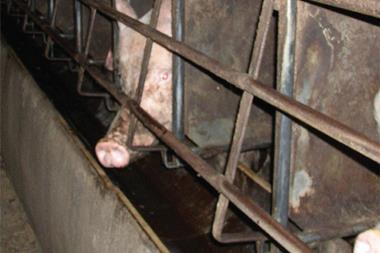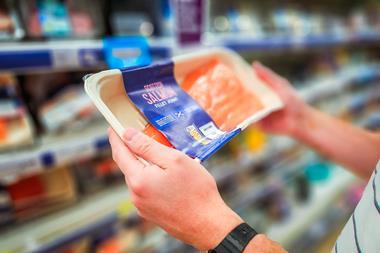Soaring prices, scores of producers leaving the sector and manufacturers scrambling to secure supplies - the aftershocks of the battery egg ban introduced this January are still being felt throughout Europe. And now new EU animal welfare reforms are threatening further turmoil.
Stricter rules on sow stalls will come into force across the EU on 1 January 2013, prohibiting pork producers from rearing pigs in stalls from four weeks after mating. The likely knock-on effect of this “partial sow stall ban”, according to Bpex, will be a 5% to 10% fall in pig production across the EU as non-compliant producers drop out, leaving processors, retailers and - ultimately - consumers facing price increases.
Bpex is expecting prices to go up by at least 10% - and everyone in the pork supply chain is desperate to avoid a repeat of the battery eggs fiasco, which saw the EU average price for eggs rise by 75% between March 2011 and March 2012 as suppliers scrabbled to find legally produced eggs [Market impact of EU regulations on group housing of sows report, Bpex, April 2012]. To ensure a smoother transition for the sow stall ban, it is vital the pig industry doesn’t repeat the mistakes made when the battery eggs ban was introduced. “If we work together we can avoid the worst impacts,” says Bpex chairman Stewart Houston.
So just what are the key lessons from the battery egg ban and what impact will the new sow stall regulations have on the UK supply chain and availability of products?
Industry experts agree the scale of market disruption will, to a large degree, depend on how prepared member states are for the changes, and how rigorously the European Commission enforces the ban.
The UK has a head start on compliance with the new rules - the use of sow stalls was outlawed here in 1999 on animal welfare grounds, meaning UK pork producers have, in effect, been competing at a disadvantage with their EU peers for over a decade. The impact is plain to see in the size of the UK pig herd - the number of pigs reared in the UK has fallen by 40% since 1999 as retailers, manufacturers and foodservice operators turned to cheaper imports.
With over half Britain’s pork supply currently coming from Europe, the increased demand from EU processors and retailers for legally produced pork come 1 January 2013 is likely to drive up the price of pigmeat across the board, spelling an end to cheap pork promotions across the EU.
And the picture on compliance in the EU doesn’t look promising. To date, only the UK, Sweden and Luxembourg are fully compliant and, already, 12 member states have been unable to assure the European Commission they will be fully compliant by 1 January. The EC says a further three unnamed countries have not replied at all to requests for information. In addition, some states have indicated they expect a “significant number” of producers to quit or allow their herds to run down, as they will be unable or unwilling to comply.
All this would appear to create a perfect storm, but Bpex sector director Mick Sloyan believes the work organisations such as his have done to highlight the issue means the market will be better prepared, with retailers and processors acting early to ensure their supply chains are not affected.
There’s an important lesson for the pork industry in how robustly the Commission handled the battery egg ban, Sloyan adds. “There was an unwritten - but spoken - view that derogations were going to be put in place, and that led to a little bit of complacency and a lack of forward planning.” When the Commission didn’t allow derogations, “people were a bit shocked that it acted quite as strongly as it did”, he says.
The EC has already made very clear it has a serious appetite for serious enforcement. Recently, Andrea Gavinelli, EC director-general for health and consumers, told a meeting of members of the European Parliament that the “Commission is using all tools available at EU level to push member states to comply” and outspoken MEPs such as Scottish Lib Dem George Lyon are pushing hard to ensure there won’t be any derogations. No matter how much companies prepare, however, the potential for market disruption is significant. Currently, the UK is roughly 40% self-sufficient in pork, and most of that is fresh pork sold at a premium. “The UK market has been all about a premium for legs and loins, but for everything else we’ve been competing on a Europe-wide basis,” says Jim Brisby, sales and marketing director at meat supplier Cranswick.
It’s in this “everything else” category Brisby believes the UK is going to feel the effects of the ban the most, particularly on cheaper European cuts that are brought in and sold on multibuy promotions or processed and turned into cooked meats.
With more suppliers competing for compliant product, prices on those products are almost certain to increase, both at the producer and retailer end. “At some point, they will have to feed all the way through to the consumer, otherwise there is further squeezing on industry margins and it becomes unsustainable,” says Brisby.
For many UK processors like Cranswick and Vion, finding compliant suppliers is unlikely to be a problem. The real challenge will be in guaranteeing that these same suppliers will be able to fulfil their long-term volume requirements in light of greater competition from European customers.
Rob Smith, Vion’s group communications controller, however, believes Vion’s robust supply chain will protect it from the worst of the market disruption. “We have worked over many years to develop long-term relationships with farmers,” he says.
Brisby also points out that many UK suppliers and retailers are already committed to not selling pork from sow stalls. Tesco, for example, requires that all its UK and EU pig farms comply with its livestock standards, which do not permit the use of stalls or tethers. Sainsbury’s says “all our fresh pork is reared to high welfare standards, where we do not allow the use of stalls, and we will ensure any pork within Sainsbury’s product adheres to the 2013 legal requirements”, while Asda says all its suppliers will be compliant as of 1 January 2013.
Retailers would be foolish not to guarantee they will supply only legally produced pork products as of 2013, says Lyon. “It would have a very detrimental effect on the brand for consumers to find out they were selling product from illegal systems.” He is also calling on national governments to ensure processors and retailers are aware of the implications of non-compliance.
Defra says it is “talking with retailers, processors and industry organisations to draw up our approach”. With only eight months to go, it’s high time to turn words into action.
Bacon set to feel the heat
Bacon butties, bangers and mash, pork pies - the partial sow stall ban is going to have a major impact on the supply and price of many pork products that are staple parts of the British diet.
In particular, supplies of imported fresh pork - which currently makes up the bulk of pork promotions - are set to tighten, putting an end to the deep discounting of foreign meat that currently means British pork sells at a significant premium.
Prices are also likely to go up on bacon, as two of the main producing EU nations - Germany and the Netherlands - are set to fall short of full compliance by 1 January 2013. “We’re likely to see more pressure on the bacon side because you’re going to have a lot of people trying to source product throughout Europe that is compliant,” says Bpex sector director Mick Sloyan.
Sloyan also cites leg meat - which is used to make cooked hams - as a product that will become harder to source legitimately. “It tends to be a much more commodity-driven product,” he says. “Some of the meat that is sold on the spot market is where problems are likely to arise.”
Elsewhere, retailers will be under pressure to scrutinise the supply of imported meats such as salamis, hams and sausages, where Sloyan believes “you’re likely to see a bit of a pinch at the commodity end”.
Retailers will argue they can only take direct responsibility for own-label products, but Sloyan believes they need to be accountable for all meat products sold on their shelves - own-label and branded. “Consumers won’t be aware of traceability, but the supermarkets should be,” he says. “If the supermarkets are going to try and almost abdicate that responsibility to suppliers, I think a lot of their consumers are going to be very disappointed. Fresh and processed meat more than anything else is something in which consumers place all of their trust in retailers.”
Topics
Meat & Fish Supplement 2012

The big players in meat snacks are in doldrums, but smaller players are growing strongly. Plus the EU’s…
- 1
- 2
- 3
- 4
- 5
 Currently
reading
Currently
reading
The sow stall ban: how will it affect UK pig producers?
- 7
- 8
- 9



































No comments yet